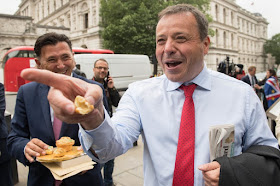 |
| Banks needs to account for Brexit spending. (PA/Stefan Rousseau) |
There have also been fines for overspending on Brexit campaigns and questions about how voter data was used.
All these events have led to a new legal case being listed for an oral hearing in the High Court on December 7. This will argue that Brexit must be declared void and that the notification of Article 50 must be nullified. It is being led by two Queens’ Counsel against the prime minister. So, if the investigation against Banks confirms wrongdoing, can Brexit be declared void in court?
There is no doubt that potentially criminal overspending, data-harvesting and Russian interference delegitimise the Brexit poll in the public’s eye. But it also matters because at common law, votes can be void when they break the law. The common law principle applies to all votes: both elections and referendums.
The constitutional principle was applied in a case called Morgan v Simpson. In 1975, a group of citizens in Croydon argued that a Greater London Council candidate’s election was invalid because 44 votes had not been counted. First, the Court of Appeal held if an “election was conducted so badly that it was not substantially in accordance with the law as to elections, the election is vitiated, irrespective of whether the result was affected or not”. It also said that where there is an irregularity – even one that isn’t major – that “did affect the result”, a vote must also be declared void.
This is part of the general legal principle that “fraud unravels everything”. “Fraud” in law is an objective concept. It would implicate any potentially fraudulent funding of Brexit.
It means that the people’s “order” that the prime minister trigger article 50 and negotiate to leave the European Union could be unravelled.
It could include the fraudulent appropriation of Facebook data. If official campaign Vote Leave knowingly overspent, that might be have implications too, as would potentially fraudulent funding of Brexit by Russia through Arron Banks. It means that the people’s “order” that the prime minister trigger Article 50 and negotiate to leave the European Union could be unravelled.
The case that argues Brexit is void, which gets its first hearing on December 7, is called Wilson v Prime Minister. The barristers’ argument is well worth reading in full, but the opening sentence is gives the gist: it asks whether a “free and fair vote is one of the constitutional requirements of the United Kingdom”. Wilson and the other claimants submit that it is.
Now, it’s a big thing to litigate the very validity of Brexit. But if Russian athletes win Olympic medals when they are taking drugs, their victories are not valid. The same is true of a corrupt vote.
What’s clear is that the UK is in a terrible situation. There is a very real risk of ending a 210-year union between Britain and Northern Ireland, and the 311-year union between England, Wales and Scotland.
For Russia, the power to disable two permanent members of the United Nations Security Council in two years is an earth-shaking geopolitical victory. It didn’t work with Marine Le Pen in France, and it can’t touch China. But if it gave the UK Brexit, and the US Trump, British parliamentarians need to look impartially and dispassionately at what has been unfolding, and act.
The British constitution is not codified, but it is written in the case law and the statute books. The law tells us every vote must be free and fair. If Brexit was not, as more and more evidence appears to show, it’s time to bury it.
About Today's Contributor:
Ewan McGaughey, Senior Lecturer in Private Law, King's College London
This article is republished from The Conversation under a Creative Commons license.
 |
| "Is this your collar I can feel Mr Banks?" - The Brexit Comic |
 |
| "Three Wise Mays" - The Brexit Comic |
 |
| "*BREAKING* Johnson & Gove admit Vote Leave was wrong to stoke fears about immigration ... oh and breaking electoral law ..." The Brexit Comic |
